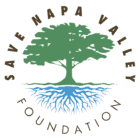Op-Ed by: Save Napa Valley Foundation
Download
We see every day, with our own eyes, that water is in short supply. Water trucks crisscross the Valley making deliveries to customers with dry wells and empty reservoirs. The mainstem Napa River is more dry than wet above the tidal zone. Parts of it, like St. Helena at the Pope Street Bridge, are choked with algae. While we hope that the fishes found someplace to go, we know many of them did not.
The U.S. has just passed legislation that will meaningfully address the climate crisis by investing in renewable energy and so much more, and we anticipate that stronger international agreements will follow. In the meantime, locally, we have the unique opportunity right now to act to protect our groundwater resources. Thanks to the Sustainable Groundwater Management Act, control of groundwater from Calistoga to the Soscol House in Napa is in the hands of our elected officials in the form of the Groundwater Sustainability Agency (GSA), which has the same membership as our Board of Supervisors.
The GSA has the authority to call for management practices which are clearly outlined in the draft Groundwater Sustainability Plan, right now. In March, Governor Newsom’s Executive Order on drought mandated GSAs to review many new well permits. While other GSAs have taken drastic actions following this order, ours has done the least legally allowed.
The GSA/BOS has delayed at every turn, even though they are aware that we’re extracting more water than comes in. At their March 22 meeting, the GSA heard that several groundwater management thresholds had been exceeded. County Planning Director David Morrison explained, “The curve is accelerating, in terms of the drought.” He said, “The problem is, the aquifer is not recovering, because we’re not getting the rain for the aquifer to recover.” (3:49:40).
With signs of water scarcity everywhere, GSA members have repeatedly said they will wait for guidance from their nascent Technical Advisory Group before doing anything. Will groundwater management languish alongside our Climate Action Plan, LAFCO’s call for a county-wide water agency, and half- hearted attempts by the County at drought planning? If so, who does that foot-dragging benefit?
There may be short-term economic gains for some businesses. However, there is no lasting benefit, and there may be significant lasting harm, to agricultural interests, wineries, residents, municipalities, our natural environment, and groundwater dependent ecosystems.
We are at risk for loss of additional well productivity, subsidence, loss of plants, animals, and beautiful rivers and streams. For individual well owners and waterways, this delay may well bring devastating outcomes that could easily be avoided with an early response.
Legally, when we push the envelope on catastrophe by not addressing our significant water issues now, future compliance with SGMA is at risk. That could lead State Agencies to step in and manage groundwater for us. Ignoring the immediacy of our water crisis has costs that we cannot ignore.
What we most wish to see from our GSA is immediate action on managing groundwater pumping, along with a good-faith effort to appoint an objective, balanced, and empowered Technical Advisory Group that is strong on science. To achieve this, members representing Fisheries, Aquatic Ecology, and/or Botany be added, and Project Management Actions outlined in our Groundwater Sustainability Plan must be implemented as soon as possible. Wherever feasible, monitoring efforts should be expedited. As an example, the impacts of our water scarcity on Groundwater Dependent Ecosystems must be assessed immediately.
With SGMA, we have a golden opportunity to step up and embrace sustainability. That’s the spirit of this law. Our GSA has the authority to act, and must do so. Our drought is deep, significant, and ongoing, and the effects of climate change are increasingly apparent. We must act now to protect our scarcest shared resource, which is water.
We are tired of the delays. Where is the needed sense of urgency to protect our scarce water resources? Napa Valley is a national treasure, and our community deserves to not only survive, but to thrive into the future.
